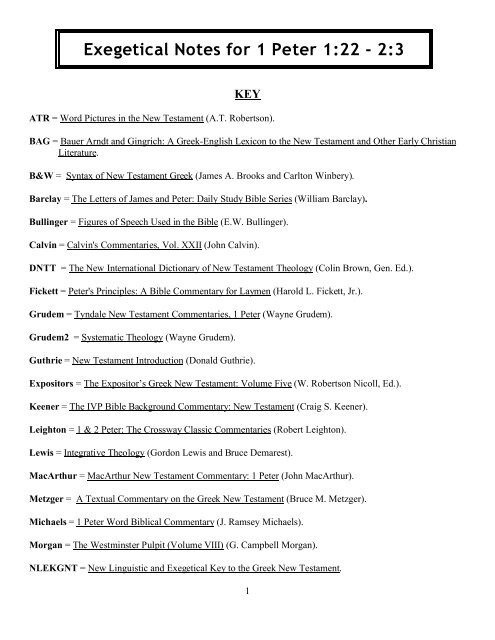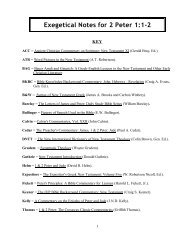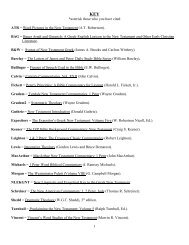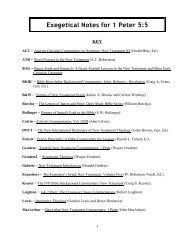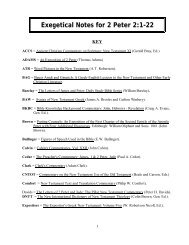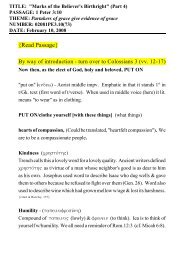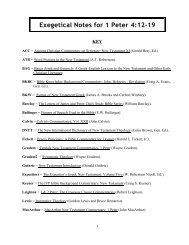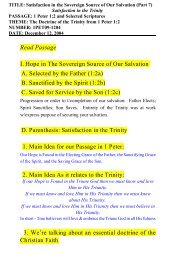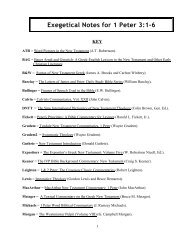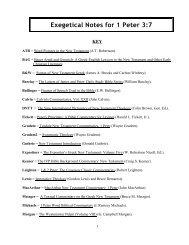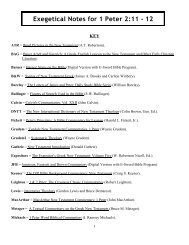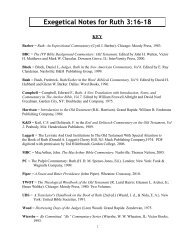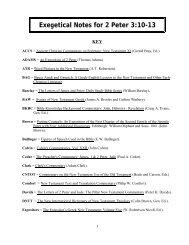Exegetical Notes for 1 Peter 1:22 - 2:3 - Tony Bartolucci Dot Com
Exegetical Notes for 1 Peter 1:22 - 2:3 - Tony Bartolucci Dot Com
Exegetical Notes for 1 Peter 1:22 - 2:3 - Tony Bartolucci Dot Com
Create successful ePaper yourself
Turn your PDF publications into a flip-book with our unique Google optimized e-Paper software.
Schreiner = The New American <strong>Com</strong>mentary: 1, 2 <strong>Peter</strong>, Jude (Thomas R. Schreiner).Shedd = Dogmatic Theology (W.G.T. Shedd), 3 rd edition.Kittle = Theological Dictionary of the New Testament (G. Kittle and G. Friedrich, Eds.).Turnbull = Proclaiming the New Testament: Volume 5 (Ralph Turnbull, Ed.).Vincent = Vincent’s Word Studies of the New Testament (Marvin R. Vincent).Wuest = First <strong>Peter</strong> in the Greek New Testament (Kenneth S. Wuest).2
TRANSLATION, OUTLINE AND CENTRAL PROPOSITIONGREEK TEXT:<strong>22</strong> 23 24 252:12 3 ENGLISH TRANSLATION:<strong>22</strong> Having purified your souls by obedience to the truth <strong>for</strong> a sincere love of the brethren, fervently love eachother from a pure heart. 23 You have been born again not out of perishable seed, but imperishable: throughthe living and enduring Word of God. 24 FOR ALL FLESH IS LIKE GRASS AND ALL OF HER GLORY IS LIKE AFLOWER OF GRASS. THE GRASS WITHERS AND THE FLOWER FADES, 25 BUT THE WORD OF THE LORD REMAINSFOREVER. And this is the Word which was preached to you.2:1 There<strong>for</strong>e, putting aside all malice, and all deceitfulness, and hypocrisy and envy and all slander, 2 Likenewborn babies, long <strong>for</strong> the pure spiritual milk, so that by it you may grow with respect to salvation– 3 ifindeed you have tasted the kindness of the Lord.TITLE(S): "Responding to the Word of Grace" (multiple parts)PASSAGE OUTLINE:I. The Results of Obedience to the Gospel (1:<strong>22</strong>-2:3)A. Love <strong>for</strong> one another (<strong>22</strong>a)1. The Means of Gospel Obedience: The Word (23)a. Born Again through the Word of God2. The Character of that Word (24-25)a. It is not like Transitory Grass of the Fields (24)b. It Endures Forever (25)(1) That is the Word that <strong>Peter</strong>'s readers heard preachedB. Putting of Sin (2:1)4
PASSAGE SUBJECT/THEME (what is the passage talking about): The believer's response to the Gospel (Wordof God)...PASSAGE COMPLEMENT/THRUST (what is the passage saying about what it’s talking about): ...is toresult in love <strong>for</strong> the brethren, remembrance of the Word, resistance to Sin, and hunger <strong>for</strong> Spiritual Milk.PASSAGE MAIN IDEA (central proposition of the text): Rightly Responding to the Word of Grace bringsBrotherly Love, Appreciation <strong>for</strong> Scripture, Resistance to Sin, and Hunger <strong>for</strong> Spiritual Milk.PURPOSE OF THE SERMON (on the basis of the CPT what does God want us to learn and do?): God wantsus to fervently love one another, remembering the precious nature of His Word, <strong>for</strong>saking sin while pursuingspiritual milk.SERMON SUBJECT/THEME (what am I talking about): Rightly Responding to the Word of GraceSERMON COMPLEMENT/THRUST (what am I saying about what I am talking about): ... Brings BrotherlyLove, Appreciation <strong>for</strong> Scripture, Resistance to Sin, and a Greater Hunger <strong>for</strong> Spiritual Milk.INITIAL CENTRAL PROPOSITION OF THE SERMON: Rightly Responding to the Word of Grace WillBring Great Blessing in Your Spiritual Race.MEMORABLE CENTRAL PROPOSITION OF THE SERMON: Responding to the Word of Grace WillBring God's Blessing in Your Spiritual Race.SERMONIC IDEA/TITLE: "Responding to the Word of Grace"FINAL SERMON OUTLINE:I. Rightly Responding to the Word of Grace (1:<strong>22</strong>-2:3)A. Rekindle Your Love <strong>for</strong> the Brethren (<strong>22</strong>a) "What is the Measure of my Love?"1. Ten Ideas on What This Love Looks Like . . .B. Remember Your Response to the Word (23-25) "What is my Perspective on Scripture?"1. Remember the Word that Saved You (23a)a. Saved to love each other (23a)2. Remember the Nature of the Word that Saved You (23b-25a)a. It is Imperishable (23b)b. It is Living and Abiding (23b)c. It is God's (23c)d. It is Eternal (24-25a)3. Remember the Preaching of the Word that Saved You (25b)C. Resist Your Temptations to Sin (2:1) "What am I Putting Aside?"1. Two Sides of One Coin (C and D go together . . .)6
D. Renew Your Spiritual Hunger (2:2) "What Taste is in my Mouth?"a. Have you Tasted of God's Goodness? (v. 3)b. Long <strong>for</strong> That Which Brings Spiritual Growth (v. 2)7
1:<strong>22</strong> EXEGESISGREEK TEXT:( * Accus. Fem. Pl.). Accus. of direct object.(* Gen. 2PP Indep. Personal P.N.).(– to purify * Nom. Masc. Pl. Perfect Active Ptcp.). Adverbial-Modal Ptcp. (could perhapsbe adverbial-conditional and translated "If you have purified . . .").( – obedience, fem. * Dat. Fem. Sing.). Dative/Instrumental of means.( * Gen. Fem. Sing.). Gen. with a noun of action (). Objective Genitive (the wordin the gen. receives the action implied by the noun of action).(, fem. – brotherly love * Accus. Fem. Sing.). Accus. of relationship.( – Adj. sincere, without hypocrisy * Accus. Fem. Sing.).( * Adj. Gen. Fem. Sing.).( * Gen. Fem. Sing.). Gen.-Ablative of source. ( – one another * Accus. Masc. Pl. reciprocal P.N.).(* 2P 1 st Aor. Act. Impv.). Aorist tense in the Impv. indicates simple, or punctiliar action.Impv. of command.( – fervently, eagerly, constantly * Adv.).ENGLISH TRANSLATION:Having purified your souls by obedience to the truth <strong>for</strong> a sincere love of the brethren, fervently love eachother from a pure heart.CONTEXTUAL, GRAMMATICAL, THEOLOGICAL, APPLICATIONAL ANALYSIS:Having purified your souls by obedience to the truth ()(* Accus. Fem. Pl.). Accus. of direct object. Note <strong>Peter</strong>'s usage in 1:9, 2:11, 2:25, 3:20, 4:19.Soul can refer to the immaterial part of man (dichotomy) - cf. Matt. 10:28 where it is contrasted w/body. Or it canrefer to a person, who you are (cf. 3:20). Encompasses both salvation and sanctification. The two come together(cf. vv. 15-16).Background to this phrase appears to be Jeremiah 6:16 in the LXX "see what is the good way and walk in it and youshall find purification() to your souls ()."Jesus was also drawing from Jeremiah 6:16 in his words of Matthew 11:29 -Matthew 11:29 “Take My yoke upon you, and learn from Me, <strong>for</strong> I am gentle and humble in heart; and YOU SHALLFIND REST FOR YOUR SOULS.9
See that in Romans 16:26 talks about t/gospel being “made known to all the nations, leading to obedience offaith.”ACT 6:7 And the word of God kept on spreading; and the number of the disciples continued to increase greatly inJerusalem, and a great many of the priests were becoming obedient to the faith.Sometimes it’s put in negative terms==>John 3:36 “He who believes in the Son has eternal life; but he who does not obey the Son shall not see life,but the wrath of God abides on him.”Fig. of speech called Hendiadys (2 diff. words used to say same thing).We see t/same thing in 2 Thess. 1:8==>(where it says that at His second coming, Jesus will deal out) retribution to those who do not know Godand to those who do not obey the gospel of our Lord Jesus.Those who obey X are those who believe. They are then referred to as "obedient children" (v. 14).ACT 6:7 And the word of God kept on spreading; and the number of the disciples continued to increasegreatly in Jerusalem, and a great many of the priests were becoming obedient to the faith.ROM 1:5 through whom we have received grace and apostleship to bring about {the} obedience of faithamong all the Gentiles, <strong>for</strong> His name's sake,ROM 2:8 but to those who are selfishly ambitious and do not obey the truth, but obey unrighteousness, wrathand indignation.HEB 5:9 And having been made perfect, He became to all those who obey Him the source of eternalsalvation,1PE 4:17 For {it is} time <strong>for</strong> judgment to begin with the household of God; and if {it begins} with us first,what {will be} the outcome <strong>for</strong> those who do not obey the gospel of God?Truth = God's Word (context). Specifically the gospel. Cf. John 17:17 "Sanctify them in the truth; Thy word istruth."There are two textual issues in this verse. The first is reflected by the KJV which adds the words "through theSpirit" as follows:Seeing ye have purified your souls in obeying the truth through the Spirit unto unfeigned love of thebrethren, see that ye love one another with a pure heart fervently:Metzger's commentary is as follows:" {A} – After the Textus Receptus, following the later uncials (K P 049 056 0142) and11
most minuscules, adds the phrase . These words, whose absence from such early and goodwitnesses as 72 A B G C 33 1739 al cannot easily be explained if they were present originally, appearto be a theological expansion introduced by a copyist. In the West several Old Latin manuscripts and theVulgate replaced with caritatis ('charity'), and one witness (Speculum) expanded with fidei perspiritum ('faith through the Spirit')." [Metzger, A Textual <strong>Com</strong>mentary on the Greek New Testament]"The majority of MSS add here the words 'through the Spirit' (), but the most important earlyMSS (P 72 , , A, B, C, ) and the most ancient version omit them. There is no reason why they would havebeen dropped if they were original; more likely they were added by scribes to accent the role of the Spiritin conversion . . ." [Michaels, 72]<strong>for</strong> a sincere love of the brethren, ()(* Gen. Fem. Sing.). Gen. with a noun of action (). Objective Genitive (the wordin the gen. receives the action implied by the noun of action).The Latin Vulgate translates this word in Latin with the word "fraternitalis" (fraternity).fem. – brotherly love * Accus. Fem. Sing.). Accus. of relationship. Rememberlast week's passage in 1 Timothy 5:1-2 - brotherly love. Jesus in Matt. 23:8 said that all who know him are"brothers." – Adj. sincere, without hypocrisy * Accus. Fem. Sing.).What does it mean to be a "hypocrite?" Basically hypocrites present themselves as something or someone other thanwho they really are. An example of this is given by W. Robert Cook, who <strong>for</strong> years taught systematic theology atWestern Seminary in Portland:"Several years ago, in a trip to Greece, I visited the ancient side of Epidaurus. Among the things I saw was amagnificent outdoor theater dating back to the 3d century B.C. It has near perfect acoustics due to the mathematicalprecision with which it was planned and build. It is said that all 12,000 people could hear the slightest breath or thetearing of a piece of paper from the stage without any amplification. As she was describing this remarkable sight tous I noticed that our Greek guide was continually referring to the "hypocrites" who per<strong>for</strong>med on the stage. Onoccasion, as she would remember her audience was American, she would restate herself and speak of the "actors."This is what it means to be a hypocrite. It means you are an "actor" playing a role that's not really who you are.Note 2:1 which implies that "malice, guile, hypocrisy, envy and slander" may have been evident among them, ora temptation among them (danger).If the sin was one of favoritism of rich over the poor, see James 2:1 ff.If you have done this then do that! To obey the truth is to know the truth; to no longer by "ignorant" (cf. 1:14).1 Thessalonians 4:9-10 9 Now as to the love of the brethren, you have no need <strong>for</strong> anyone to write to you, <strong>for</strong> youyourselves are taught by God to love one another;10 <strong>for</strong> indeed you do practice it toward all the brethren who arein all Macedonia. But we urge you, brethren, to excel still more. Note the context of 4:3-7 in light of <strong>Peter</strong>'s12
context of purification here. Cf. Hebrews 13:1; 1 <strong>Peter</strong> 3:8.Note the concept of purposefulness. Things have purpose. Some things we think may not be that important actuallyhave great purpose. (I've learned that whenever I've done something stupid w/the computer, like delete some littlefile, one of thousands, thinking it wasn't imp. Then t/computer won't work!). One of the purposes of being purified,of being saved & sanctified is brotherly love. <strong>Peter</strong> is saying, this is a purpose <strong>for</strong> which God saved you. There<strong>for</strong>e,do it. "fervently love each other from a pure heart."fervently love each other from a pure heart. ()(* Adj. Gen. Fem. Sing.). This is the likely reading; see Metzger's note below:The second relates to the word which is used as an adjective be<strong>for</strong>e . Some translations footnotethe word and the ESV includes it in their translation. Metzger's commentary is as follows:" {C} – On the strength of 72 * C 81 614, a majority of the <strong>Com</strong>mittee preferredthe reading , but, in view of the absence of the adjective from A B vg. thought it bestto enclose within square brackets. The singular reading ( c ) may have arisenthrough confusion with the following ." [Metzger] * Gen. Fem. Sing.). Gen.-Ablative of source. The heart is the seat of personality in man; parallelsbeing created in God's image.– one another * Accus. Masc. Pl. reciprocal P.N.).* 2P 1 st Aor. Act. Impv.). Aorist tense in the Impv. indicates simple, or punctiliar action.Impv. of command.– fervently, eagerly, constantly * Adv.). Not just intensity, but also constancy. Cf. Kittle, 2:463."The words are compounded with the verb , to stretch, and signify intense strain; feeling on the rack."[Vincent]Latin = intentius (intently); used in LXX of crying out to God (Jonah 3:8). Also used of a warm and friendlyreception or welcome [Expositors, 53]"The word here used, , may not only design the intenseness of it, but the extensiveness of it also; as that itshould reach to all the saints, the poor as well as the rich, and the lesser as well as the greater and more knowingbelievers; and likewise may denote the continuance of it; it ought to be continually exercised, and to last always;and so the Arabic version renders it, “with a perpetual love”. []Sev. times in my ministry I have been on the receiving end of another Xns "love" which was anything but love.Sometimes we whitewash our actions by telling someone else that "this is out of love." Cf. Dave Innis Email. Wethrow that love thing around quite a bit, don't we? If I really loved you I'd go to the wall <strong>for</strong> you. Note people whotalk love but when something happens they're gone, never to be heard from again.13
{child} born of Him. By this we know that we love the children of God, when we love God and observehis commandments.Some ideas to develop . . . 10xLove <strong>for</strong> each other begins with a love <strong>for</strong> God (1 John) You will Love God (1 John).Love <strong>for</strong> each other begins with a love <strong>for</strong> the truth (context here) You will Love God's Word.Love <strong>for</strong> each other flows out of a love <strong>for</strong> the church. You will Love God's ChurchLove <strong>for</strong> each other means we stick together You will be Glue.Disunity is a de<strong>for</strong>mity; monstrosity divisiveLove <strong>for</strong> each other means we prefer others be<strong>for</strong>e ourselves (Phil. 2:1ff.) You will be Selfless.Love <strong>for</strong> each other means we serve one anotherLove <strong>for</strong> each other means we lay down our lives <strong>for</strong> each other (fig. or lit.)Love <strong>for</strong> each other requires humility; No celebrities or hero worship.Love <strong>for</strong> each other means we are willing to correct. You will risk.I have a little joke about how you know someone is really your friend. A friend will tell you if youhave a bugger in your nose.Church discipline as the most loving thing we can do.Love means we receive correction (Proverbs 12:1; 13:8). You will Heed.ROMANS 1:17 SOLA SCRIPTURATheme of Proverbs is that wise people receive instruction and correction.foolish people won't listen, learn. won't be corrected. They know it all. Fool.Love means we pray <strong>for</strong> each other. You will be on your knees.Love <strong>for</strong> each other means we are considerate of one another You will be nice.Love means we help each other during times of need (James, 1 John ). You will be There.15
1:23 EXEGESISGREEK TEXT:( – to beget * Nom. Masc. Pl. Perfect Passive Ptcp.). Substantival Ptcp.(, fem. – seed * Gen. Fem. Sing.). Gen./Ablative of source.( – perishable * Adj. Gen. Fem. Sing.).( – imperishable * Adj. Gen. Fem. Sing.).( * Gen. Masc. Sing.). Gen./Ablative of means.(– to purify * Gen. Masc. Sing. Present Active Ptcp.). Adverbial-Modal Ptcp.( * Gen. Masc. Sing.). Gen. of possession.( * Gen. Masc. Sing. Present Active Ptcp.). Adverbial-Modal Ptcp.ENGLISH TRANSLATION:You have been born again not out of perishable seed, but imperishable: through the living and abiding Wordof God.CONTEXTUAL, GRAMMATICAL, THEOLOGICAL, APPLICATIONAL ANALYSIS:You have been born again ()<strong>Peter</strong>'s point here is to undergird the reason why his readers are to love one another. (this was one of my 9 closingpoints from last week). We are saved to love each other. ( – to beget * Nom. Masc. Pl. Perfect Passive Ptcp.). Note perfect tense.Substantival Ptcp. Note the concept of being "born-again."Colossians 2:13 And when you were dead in your transgressions and the uncircumcision of your flesh, Hemade you alive together with Him, having <strong>for</strong>given us all our transgressions,Titus 3:5 He saved us, not on the basis of deeds which we have done in righteousness, but according to Hismercy, by the washing of regeneration and renewing by the Holy Spirit,James 1:18 In the exercise of His will He brought us <strong>for</strong>th by the word of truth, so that we might be, as itwere, the first fruits among His creatures.Sermon notes from 1:3 (Born Again)I. The Elements of the Sovereign Joy of Our Salvation (3-9)16
A. It was Prompted by God's Great Mercy (3a)1. <strong>Peter</strong> begins with a doxology - a word of praise to GodBlessed be the God . . .a. Very Jewish in <strong>for</strong>m (familiar in the OT)It is called a "berakah" - a Jewish <strong>for</strong>m of blessing that regularly began w/the statement "Blessed be God . . . "1KI 8:15 . . . "Blessed be the \Lord,\ the God of Israel . . .1CH 29:10 . . . David blessed the \Lord\ in the sight of all the assembly . . .PSA 72:18 Blessed be the \Lord\ God, the God of Israel . . .PSA 72:19 . . . blessed be His glorious name <strong>for</strong>ever; And may the whole earth be filled with His glory. . .[Very common in the LXX used 24 times (Michaels, 17)]See it also in t/NT (in same <strong>for</strong>m we see it here)==>In both 2 Cor. & Eph. 1:3 Blessed {be} the God and Father of our Lord Jesus Christ . . .b. Lit. "Blessed the God" "Be" isn't in t/original, it's impliedFrom t/word (eulogy)From the Gk. (good) and (to speak or say). To speak or say good about someone.That's what a "eulogy" is - a good word about someone else. I've often wondered why we wait until people are deadto tell them so.Of course, the other side of that is this mystery: No matter how rotten someone was, people say good things abouthim at the funeral (ever notice that?). Everyone looks great, too. People stand there & say, "Oh look how greathe looks." What do you mean he looks great; he's dead. If it takes my death <strong>for</strong> me to look great something's wrong!c. Here is a living eulogy to a living GodBlessed be the God and Father of our Lord Jesus Christ,| |OT/Old Covt. Doxology NT/New Covt. DoxologyMost of the time in NT (esp. true in Paul), word "God" refers to t/Father, "Lord" to t/Son. Even here we continueto have trinitarian overtones.In fact, this extended section follows a trinitarian <strong>for</strong>mula (vv. 3-5 focus on t/Father; vv. 6-9, focus on t/Son, vv.10-12, focus on t/H.S.).Blessed be the God and Father of our Lord Jesus Christ . . .Sounds a bit like John 20:17 where Jesus said to Mary immed. after His Res. ==>". . . go to My brethren, and say to them, ‘I ascend to My Father and your Father, and My God and your God.’"1. <strong>Peter</strong> begins with a doxology - a word of praise to God17
Reminder that we are those who worship. John 4 says that God seeks true worshipers. Luke 19 says that Jesus hascome to seek and save that which was lost. Put t/two together and what do you have? We who were lost who werefound by X to be worshipers of t/Living God.Phil. 3:3==> <strong>for</strong> we are the true circumcision, who worship in the Spirit of God and glory in Christ Jesus and put noconfidence in the flesh,d. Put it in the context:<strong>Peter</strong> writes to those who are hurting and weary. Worship is medicine to a weary soul.I think of t/OT Patriarch Job. In Job chapter one Job loses his livestock, his camels, his servants, and, worst of allhis sons and daughters – all in the course of a few hours. And you think you've had a bad day! Talk to Job aboutit! His response was two-fold (1:20): He grieved and he worshiped. "How could he do both?" First of all, I wouldsay he could do both because t/Spirit of God resided within him. Secondly, He could do both because he knew whatworship really was.True worship transcends circumstances. How often do we say, "Praise God. I got a new job." "Praise God. I gota new house." "Praise God, the tests were negative." Not that there's anything wrong with that. But true worshipcan grieve and praise at the same time. True worship can say, "Praise God in spite of not getting the new house //not getting t/new job // the test results.True worship can do this because God inhabits the praises of his people. True worship is medicine to a weary soul." . . . to lead the mind to praise God is one of the surest ways of uplifting it from depression. The wild beasts of anxiety anddiscontent which surround our [camp ground] in the wilderness, will be driven away by the fire of our gratitude and the songof our praise." [C.H. Spurgeon, Sermon: "A String of Pearls" No. 948, delivered on the Lord's Day Morning, August 28, 1870]Here <strong>Peter</strong> thanks God <strong>for</strong> what He has done, first of all, in our salvation. Rem. that's what we're talking about==>I. The Elements of the Sovereign Joy of Our Salvation (3-9)A. It was Prompted by God's Great Mercy (3a)Blessed be the God and Father of our Lord Jesus Christ, who ACCORDING TO HIS GREAT MERCY hascaused us to be born again . . .We can experience sovereign joy because of God's sovereign mercy!e. Wasn't just mercy, it was great mercy"Great sins and great miseries need great mercy, and many sins and miseries need many mercies." [St. Bernard, cited in Leighton,21]Is it not by great mercy that t/children of Satan, children of wrath, can become children of a thrice-holy God? Cf.2:10.We need mercy. In fact, no other attribute of God could have saved us if his mercy had refused to do so. It is fromthe fountain of God's mercy that our hope springs <strong>for</strong>th.In Eph. 2:4-5 But God, being rich in mercy, because of His great love with which He loved us, even when we were deadin our transgressions, made us alive together with Christ (by grace you have been saved)18
God is in t/mercy business. He is the "God of all mercies" (2 Cor. 1:3)(1) Mercy isn't the same as grace (both work together)Rem. grace is getting what you don't deserve, mercy is not getting what you do deserve. M. focuses on our lost,sinful condition, grace focuses on our guilt M. takes us from misery to glory, grace from guilt to acquittal.We are never too bad to be outside the reach of God's mercy and we are never too good to no longer need God'smercy.This is an element of t/sovereign joy of our salvation. Mercy of God poured out at the cross of JC <strong>for</strong> us."Will you, my fellow debtor, stand still a while and contemplate the abundant mercy of our blessed God A river deep andbroad is be<strong>for</strong>e you. Track it to its fountain head; see it welling up . . . in the eternal purposes of infinite wisdom. The secretsource is no small spring, no mere bubbling pond, it is a very Geyser, therewith. Not even an angel could fathom the springsof eternal life or measure the depth of infinite grace. Follow now the stream; mark it in all its course. See how it widens anddeepens, how at the [foot of the cross] it expands into a measureless river! Mark how the filthy come and wash; see howeach polluted one comes up milk-white from the washing. Note how the dead are brought to be bathed in this sacred stream,and mark how they live in the moment that they touch its wave . . . " [C.H. Spurgeon, Sermon: "A String of Pearls" No. 948, delivered on theLord's Day Morning, August 28, 1870]Blessed be the God who acts in history . . . God has acted on your behalf. One thing to say God created t/universe(certainly a big accomplishment & pictures God's transcendence). But God also created you and recreated you inJC (immanence). That's our second point.I. The Elements of the Sovereign Joy of Our Salvation (3-9)A. It was Prompted by God's Great Mercy (3a)that was in eternity when he chose us & at t/cross when he provided salvation <strong>for</strong> us. Brings us to t/present.B. It is Accomplished Through Our New Birth (3b)This is t/moment of our regeneration // justification. When we are born again to new life in X....according to his great mercy [he] has caused us to be born again...1. Note that: He has "caused us to be born again"That's a doctrine of grace - He caused us to be born again (why it's grace)a. Word is (again) + (to beget or cause to be born). In t/Gk. text, t/active voice gives t/word almost t/sense of atitle. Sort of like saying, "God the Birther" (points to his parentage). Like 1 John 5:1 ("whoever believes that Jesusis the Christ is born of God")"God's sovereign mercy unto God's sovereign glory resulting in the sovereign joy of our salvation."2. As someone once said, "Born once die twice, born twice die once"Our 1 st birth gave us t/image of the 1 st Adam, a fallen man. Our 2 nd birth gives us t/image of the 2 nd Adam, JCt/righteous. To be born once is to be born into a curse of death. To be born again is to be born unto a blessing: aliving hope and an eternal inheritance (v. 4).19
3. Expanding on this doctrine of new birth (7ideas)a. #1 - We are born-again by God's willHe birthed us; He found us. People will say, "I found God!" Well, I didn't know he was lost. No, you didn't findGod, he found you.Religion is people trying to find God. Xnty is God finding His people.Why <strong>Peter</strong> begins by saying, "Blessed be God!""The new birth is monergistic; it is solely a work of the Holy Spirit. Sinners do not cooperate in theirspiritual births (cf. Eph. 2:1-10) anymore than infants cooperate in their spiritual births." [MacArthur, 92](1) Remember Romans 9?Paul is dealing w/issue of God's sovereignty - that fact that God is in control over his creation as the potter hascontrol over t/clay.14 What shall we say then? There is no injustice with God, is there? May it never be!15 For He says to Moses, “I WILL HAVEMERCY ON WHOM I HAVE MERCY, AND I WILL HAVE COMPASSION ON WHOM I HAVE COMPASSION.” 16 So then it does notdepend on the man who wills or the man who runs, but on God who has mercy. (note the word "mercy" cf. "promptedby God's great mercy").John 1:12-13 12 But as many as received Him, to them He gave the right to become children of God, even to those whobelieve in His name,13 who were born not of blood, nor of the will of the flesh, nor of the will of man, but of God.Same thing in James 1:18==>In the exercise of His will He brought us <strong>for</strong>th by the word of truth, so that we might be, as it were, the first fruits amongHis creatures.In Jeremiah 13:23 OT prophet Jeremiah asks a rhetorical question ==>“Can the Ethiopian change his skin Or the leopard his spots? (what's the answer class?).ISW - Sinful man cannot of his own will change his sinful nature. Not any more than he can change the color ofhis skin or the fact that he is a man or a woman (I know what you are thinking - listen: surgery doesn't make a mana woman or vice-versa. Genetically you are what you are & it is blasphemous to t/Creator to attempt to change thatwhich only he can do).ISW - We who are sinful cannot change our nature. We are born into sin // fallen // depraved. We can't change that,only God can do that. This is regeneration; New Birth.b. # 2 - We are born again by God's Spirit(1) John 3:1-15 No such thing as a non-born again Xn . . . .Titus 3:5 He saved us, not on the basis of deeds which we have done in righteousness, but according to His mercy, by the20
washing of regeneration and renewing by the Holy Spiritc. #3 - We are born again through the Word of TruthJames 1:18; In the exercise of His will He brought us <strong>for</strong>th by the word of truth, so that we might be, as it were, the firstfruits among His creaturesThink about God's creative activity <strong>for</strong> a moment. God created the world by the power of his word. God spoke andit existed. God recreated you in Christ through that same power - the power of His Word. Cf. 1 <strong>Peter</strong> 1:23d. #4 We are born again to righteousnessBorn to a new/trans<strong>for</strong>med life. We are cleansed from ourselves, the shackle of sin, we are united w/Christ in hisdeath and Res.When someone comes to saving faith in JC a change so radical occurs that the best way to put it is that life hasbegun all over <strong>for</strong> him or her. A new life, a better life. 2 Cor. 5:17.This was predicted in the OT in passages such as Ezek. 36==>25 “Then I will sprinkle clean water on you, and you will be clean; I will cleanse you from all your filthiness and from allyour idols.26 “Moreover, I will give you a new heart and put a new spirit within you; and I will remove the heart of stonefrom your flesh and give you a heart of flesh.27 “And I will put My Spirit within you and cause you to walk in My statutes,and you will be careful to observe My ordinances.1JO 2:29 If you know that He is righteous, you know that everyone also who practices righteousness is born of Him.1JO 3:9 No one who is born of God practices sin, because His seed abides in him; and he cannot sin, because he is born ofGod.1 John 3:9-11 9 No one who is born of God practices sin, because His seed abides in him; and he cannot sin,because he is born of God.10 By this the children of God and the children of the devil are obvious: anyone who doesnot practice righteousness is not of God, nor the one who does not love his brother.11 For this is the message whichyou have heard from the beginning, that we should love one another;Every time we fall there is grace and power to get up in victory.e. #5 - We are born again to love1JO 4:7-8 Beloved, let us love one another, <strong>for</strong> love is from God; and everyone who loves is born of God and knows God.The one who does not love does not know God, <strong>for</strong> God is love.f. #6 - We are born again to victory1JO 5:4 For whatever is born of God overcomes the world; and this is the victory that has overcome the world-- our faith.g. # 7 - Because of the above {cite} We are born again to a living hopenot out of perishable seed, but imperishable: ()(fem. – seed * Gen. Fem. Sing.). Gen./Ablative of source.21
Seed represents the source of life. Everything that comes to life in the world begins with seed. It is the basic sourcethat initiates plant and animal life. But nothing in the material world has the power to produce spiritual and eternallife. Cf. James 1:18; Romans 10:17.Why the allusion to "seed?" Cf. 1 John 3:9. "The contrast is between human seed which produces mortal humanlife and divine seed that produces eternal life (Best) [as cited in NLEGNT] Could either be a metaphor ofagriculture or of human procreation. The use of rather than the more common would imply thelatter, as well as the following two verses which point to agriculture. (used only here in NT) is used moreof the process of sowing, rather than the seed itself."God begetting a child by the seed of the word is likened to a father begetting a child by the seed of hissperm." [Schreiner, 94]Everyone is born of perishable seed. This is adamic. Everyone born of perishable seed will die. Those born of theimperishable seed will only die once. "born once die twice; born twice die once.""not of corruptible seed, but of incorruptible; referring not to seed cast into the earth, which first corruptsand dies, and then is quickened, and rises, and brings <strong>for</strong>th fruit; but to human seed, and which the Jews call, “the filthy drop” f38; which is in itself corrupt, and is corrupted, and whereby the corruption ofhuman nature is propagated; <strong>for</strong> whatsoever is born of the flesh is carnal and corrupt; and so the apostle hasreference to the first birth, or natural generation of men, in which they are polluted and depraved, andconfirms what the evangelist says, (John 1:13) that regenerate persons are not “born of blood”;or become new creatures, and holy men, by their natural descent, or first birth, be it from whom it will; <strong>for</strong>all men are of one blood originally, and that is tainted with sin; nor by the will of fallen creatures, ofcorruptible men, themselves or others; but of water, and of the Spirit, of the grace of the Spirit of God, whichis seed pure and incorruptible, having no mixture or taint of sin, nor any degree of pollution in it, and whichremains so; nor can it be corrupted by all the wickedness there is in man's heart; nor by all the pollutions ofthe world, or temptations of Satan; and this seed is conveyed into the heart by the Spirit of God, inregeneration, and it contains all grace in it;" [Gill, 36]( – perishable * Adj. Gen. Fem. Sing.).Same word is used in verse 18 ==> - perishable, subject to decay. Word that always used in NT to referto things which decay, deteriorate, war out [so Grudem, 84]. – imperishable * Adj. Gen. Fem. Sing.). Note the alpha privative.What would "perishable seed" be? Might be a parallel to the "seed" of the sower. No one is born again by perishableseed. Cf. Luke 8:11; Mark 4:14.note the prepositions ( - seed; - Word of God). The <strong>for</strong>mer is the origin or source, the latter the mediumthrough which.through the living and enduring Word of God. ()(* Gen. Masc. Sing.). Gen./Ablative of means.<strong>22</strong>
It is through the Word of God, which is the seed of the sower. The word is the means by which, or through whichwe are born again. Cf. Romans 10. James 1:18.The Word of God and the Gospel sharing the same meaning (overlap).EPH 1:13 In Him, you also, after listening to the message of truth, the gospel of your salvation-- having alsobelieved, you were sealed in Him with the Holy Spirit of promise,COL 1:5 because of the hope laid up <strong>for</strong> you in heaven, of which you previously heard in the word of truth,the gospel,COL 4:3 praying at the same time <strong>for</strong> us as well, that God may open up to us a door <strong>for</strong> the word, so that wemay speak <strong>for</strong>th the mystery of Christ, <strong>for</strong> which I have also been imprisoned;1TH 1:8 For the word of the Lord has sounded <strong>for</strong>th from you, not only in Macedonia and Achaia, but alsoin every place your faith toward God has gone <strong>for</strong>th, so that we have no need to say anything.2TH 3:1 Finally, brethren, pray <strong>for</strong> us that the word of the Lord may spread rapidly and be glorified, just as{it did} also with you;2TI 2:9 <strong>for</strong> which I suffer hardship even to imprisonment as a criminal; but the word of God is notimprisoned.Note that God's Word is two things: Living and Enduring. It is living and abiding/enduring because God is livingand enduring. Those are two if his attributes: His life/living; His eternality.Living points to the fact that the seed produces life; Enduring to the fact that the life, once begun, will nevercease or die. – to purify * Gen. Masc. Sing. Present Active Ptcp.). Adverbial-Modal Ptcp.It's not any Word. Three characteristics (or four if you count imperisable): 1) It's living (cf. Hebrews 4:12), 2)enduring, 3) it's God's.* Gen. Masc. Sing.). Gen. of possession.* Gen. Masc. Sing. Present Active Ptcp.). Adverbial-Modal Ptcp. (Hom.+; inscr., pap., LXX, Philo, Joseph.) impf. ; fut. ; 1 aor. , imper. (Hv3, 1, 9); plpf. (1J 2:19; on the lack of augment s. Bl-D. §66, 1; Mlt.-H. 190).1. intr. remain, stay—a. a pers. or thing remains where he or it is. b. fig., of someone who does not leave therealm or sphere in which he finds himself: remain, continue, abide (Pla., Ep. 10 p. 358c ; Alex. Aphr., An. II 1 p. 2, 15 =remain overcome bydoubts; Jos., Ant. 4, 185; Test. Jos. 1:3 ; Third Corinthians 3:36) IPol 5:2; cf. IEph10:3. remain in the teaching of Christ 2J 9a; cf. b (2 Macc 8:1 1 Ti 2:15. continue in what you have learned 2Ti 3:14. J 8:31. continue in my love 15:9f; cf. 1J 4:16.2:10. 3:14. J 12:46. The phrase is a favorite of J todenote an inward, enduring personal communion. So of God in his relation to Christ the Father, who abides in me J 14:10. Of the Christians in their relation to Christ J 6:56; 15:4a, c,5-7; 1J 2:6, 24c. Of Christ in his relation to the Christians J 15:4a, 5 (Gdspd., Probs. 112-15). Of theChristians in their relationship to God 1J 2:24c, 27f; 3:6, 24a; 4:13. Of God in his relation to the Christians1J 3:24; 4:12f, 15.—Vice versa, of someth. that remains in someone; likew. in Johannine usage: of the word23
of God 1J 2:14. Of the words of Christ J 15:7b; cf. 1J 2:24a, b. Of the anointing fr. heaven vs. 27. Of thelove of God 1J 3:17. Of the seed of God 3:9. Of truth 2J 2. The possession is shown to be permanent by theexpr. have someth. continually, permanently 1J 3:15; the word of God J 5:38.Instead of also remain with someone: of the Spirit of truth J 14:17. On the otherhand, of the wrath of God, it remains upon him 3:36.—GPercorara, De verbo ‘manere’ap. Jo.: Div. Thomas Piac. 40, ’37, 159-71.c. remain, last, persist, continue to live— a. of pers. (Ps 9:8 ; 101:13; Da 6:27)Christ remains (here) <strong>for</strong>ever J 12:34; cf. Hb 7:24; 1J 2:17. Pregnant remain(alive) , be alive (Epict. 3, 24, 97; Diog. L. 7, 174; Achilles Tat. 8, 10. Plut., Mor. 1042d;Eccl 7:15) J 21:<strong>22</strong>f; 1 Cor 15:6; Phil 1:25; Rv 17:10.b. of things (Maximus Tyr. 4, 8b and Polyaenus 7, 34: ; Socrat., Ep. 31 [=33]; Hierocles 15 p. 454) of a city it would have lasted untiltoday Mt 11:23. a permanent city Hb 13:14.—continue 13:1(JCambier, Salesianum 11, ’49, 62-96).—J 9:41; 15:16. if the work survives 1 Cor 3:14.Hb 10:34. 2 Cor 9:9 (Ps 111:9). Ro 9:11 (ofGod’s counsel Ps 32:11). endure 1 Pt 1:23 (cf. 1 Esdr 4:38 ). t. t. vs. 25 (Is 40:8). J 6:27. what ispermanent (Philo, Leg. All. 3, 100.—Opp. ) 2 Cor 3:11. 1 Cor 13:13 (WMarxsen, D. ‘Bleiben’ im 1 Cor 13:13, OCullmann-Festschr., ’72, <strong>22</strong>3-9; on the eschatologycf. Enoch 97, 6-10 and s. the lit. I 1a.—For the contrast [vs. 8]— cf. Pla., Crat. 44p. 440a ). M-M. B. 836.**KJV has "which liveth and abideth <strong>for</strong> ever." The addition of "<strong>for</strong> ever" is lacking in the best MSS [cf. Metzger]The Rock of Gibralter (size, in<strong>for</strong>mation?). A raven comes once every year to scratch his beak on that rock. Hescratches <strong>for</strong> 60 seconds and leaves to come again the next year. How long will it take <strong>for</strong> that raven to wear therock down to dust? That is still nothing compared to eternity."The Gospel also may be said to live, in opposition to the law, which is the killing letter; and because itpoints out the way of life and salvation to sinners; and is a means of quickening dead sinners, and ofingenerating that faith by which men live on Christ; and of revealing to them that righteousness which isunto justification of life; and of supporting and maintaining spiritual life in them; and of reviving droopingsaints; the Syriac version renders it, “the living Word of God”: and it remains, and will abide; all itspromises, blessings, doctrines, and ordinances, are lasting; it will continue in the world until all the elect ofGod are gathered in, until the second coming of Christ, and to the end of the world; notwithstanding all thepersecutions of men, and cunning, craft of false teachers, and all the ridicule and contempt it is treated withby mockers and scoffers: and will abide in the effects of it, in the hearts of the saints, to all eternity." [Gill,37-38]Implications <strong>for</strong> evangelism? Must be based on God's WordImplications <strong>for</strong> church growth "" ""The persuasive arguments of the preacher, stories, etc. not effective and eternal."No matter how powerful a preacher is, all he can do is place the seed in the ear. He can do no more. Thehearer, by paying attention, can convey the seed to his head. But it is the supreme Father and Teacher abovewho carries it into the heart, which is the only soil where it can live and bear fruit." [Leighton, 70]24
Cannot separate God from His Word. Both speak of His character.Eternality of God's Word ==> Eternality of our fellowship and love <strong>for</strong> one another. Fact that we are children isdue to God's birthing us. There<strong>for</strong>e, we are a family with a common Father who loves us; we are, there<strong>for</strong>e, to loveeach other.25
1:24 EXEGESISGREEK TEXT:( - because, there<strong>for</strong>e * coordinating conjunction).( * Adj. Nom. Fem. Sing.).( * Nom. Fem. Sing.). Subject Nom.( – like, as, even as * comparative particle).( , masc. – grass * Nom. Masc. Sing.). Predicate Nom.( * Adj. Nom. Fem. Sing.).( * Nom. Fem. Sing.). Subject Nom.( * Gen. Fem. Sing. 3P Independent personal P.N.).( , neut. – flower * Nom. Neut. Sing.). Predicate Nom. (, masc. – grass * Gen. Masc. Sing.). Gen. of description.( – to wither or dry up * 3S Aor. Passive Indic.). Gnomic Aorist.( , masc. – grass * Nom. Masc. Sing.). Subject Nom.( , neut. – flower * Nom. Neut. Sing.). Subject Nom.(– to fall, fail, weaken * 3S Aor. Act. Indic.). Gnomic Aorist.ENGLISH TRANSLATION:For ALL FLESH IS LIKE GRASS AND ALL OF HER GLORY IS LIKE A FLOWER OF GRASS. THE GRASS WITHERS ANDTHE FLOWER FADES,CONTEXTUAL, GRAMMATICAL, THEOLOGICAL, APPLICATIONAL ANALYSIS:Quote from Isa. 40:6 ff. Figure of speech called Gnome (cf. Bullinger, p.792) where all of a passage is notnecessarily quoted in its entirety. Part is from the LXX, part from the Hebrew.Isaiah 40:6-8 ==>6 A voice says, “Call out.”Then he answered, “What shall I call out?”All flesh is grass, and all its loveliness is like the flower of the field.7 The grass withers, the flower fades,When the breath of the Lord blows upon it;Surely the people are grass.26
8 The grass withers, the flower fades,But the word of our God stands <strong>for</strong>ever.This has an eye to the future salvation of Israel (cf. Isa. 52:7-8). Here <strong>Peter</strong> uses that same concept of the Gentiles."The quotation comes from Isaiah 40, where com<strong>for</strong>t is proclaimed to Israel because God will work onceagain and restore them from their exile in Babylon. The 'good news' <strong>for</strong> Israel (Isa 40:"9) is that God fulfillshis promises and that the nations of the world that seem strong cannot resist his promised word to deliverthem from exile (Isa 40:6-8). Such nations are like grass and the flower of the grass, which perish when theLord's wind blows upon them. Perhaps <strong>Peter</strong> thought of the persecutors of his day, who seemed invinciblebut whose glory was short-lived." [Schreiner, 96]Note the greater context of Isaiah, historically and biblically and how it ties into <strong>Peter</strong>'s usage here.FOR ALL FLESH IS LIKE GRASS ()All flesh is like grass = simile. "All flesh" (synecdoche) = "all of humanity."( masc. – grass * Nom. Masc. Sing.). Predicate Nom.Grass in general, or hay. That which lasts <strong>for</strong> a season and then is gone.AND ALL OF HER GLORY IS LIKE A FLOWER OF GRASS. ()"her glory" would refer to our success; prestige.( * Adj. Nom. Fem. Sing.). * Nom. Fem. Sing.). Subject Nom. * Gen. Fem. Sing. 3P Independent personal P.N.). , neut. – flower * Nom. Neut. Sing.). Predicate Nom., masc. – grass * Gen. Masc. Sing.). Gen. of description."The best flower of the field decays. Their glory soon withers. The great projects of kings and princes turn to dustin a moment. . . . Archimedes was killed in the middle of one of his demonstrations." [Leighton, 71]Cf. Princes Diana; JFK Jr.; Others . . . Even if God grands such men to live a long life, they still must facedeath. Even the most cocky and powerful men on earth who strut around like a proud rooster who rules thebarnyard will come to nothing. There will come a day when they are humbled in sickness and death.Unavoidable.Psalm 146:4 His spirit departs, he returns to the earth; In that very day his thoughts perish.THE GRASS WITHERS AND THE FLOWER FADES, ()Whether it's grass (all men in general) or the flower (those men who are prominent/celebrities) they will wither andfade away.27
Some see here a reference to the fading and finite nature of human relationships, this in view of the contextual ideathat <strong>Peter</strong> is addressing factions in the church. [cf. Expositor's, 53]The life cycle of plants is relatively short and is more visible and obvious than the life cycle of humans. Cf. theleaves of the trees here. They bud in the spring, they unfold and bloom, reach full maturity in the summer. Thenfall comes. They begin to wither (they get age spots). They turn brown and slowly but surely die. They fall off andare <strong>for</strong>ever gone. The cycle beings in the spring with brand new leaves. That's a preview in miniature of what ourlives are like. Psalm 90:12 (Moses); 39:4 (David); James 4:14; Job 14:1-2.I see that with more clarity the older I get. Once you reach 40 you are old enough to have witnessed thedeath of many older relatives and friends. You are also old enough to witness the birth and growth of thechildren of relatives and friends. When I hit 30 I experienced something I had never seen be<strong>for</strong>e: I was ablewith adult eyes to see young girls turn into young women. Now that I have hit 40 I have seen those sameyoung girls who have turned into young women now start to turn the corner where they are starting to showtheir age. You realize that it's like we're all on a long conveyer belt. You start over here as a newbie. Thebelt slowly moves along & you look ahead to the end of the belt (the death of all men) and you witness yourgreat-grandparent fall off the edge. Then your grandparents. Suddenly you're not at the beginning any more.Now there are new people, babies, children to this side of you. Then you watch your parents age & yourealize that you are the age that they were when you were in High School. Ooops. There goes my uncle.Ooops, there goes my aunt. (every so often someone gets pushed off in the middle of the ride unexpectedly- they die young). You realize that some day soon, by God's grace, you will be over here. To your left area whole bunch of young people (gee, I was over there not that long ago). To your right . . . there aren't manyleft.I've said it be<strong>for</strong>e, I'll say it again. Death is a relentless foe who always captures its prey in the end.1 Corinthians 15:55-57 55 “O death, where is your victory? O death, where is your sting?”56 The sting of deathis sin, and the power of sin is the law;57 but thanks be to God, who gives us the victory through our Lord JesusChrist.Cf. Psa. 101:11; Isa. 51:12; Jer. 12:4; Job 14:2, 15:30,33; Isa 28:1,4; 1 John 2:17.28
1:25 EXEGESISGREEK TEXT:( * Nom. Neut. Sing.). Subject Nom.( * Gen. Masc. Sing.). Gen. of possession. Objective Genitive (the word spoken about the Lord).( * 3S Pres. Ind. Act.). Descriptive or Gnomic Present.( * Accus. Masc. Sing.). Adverbial Accus. of Measure (same construction ""is used elsewhere, such as Matt. 21:19).( * Nom. Neut. Sing. near demonstrative P.N.).( * 3S Pres. Ind. Act.).( * Nom. Neut. Sing.). Pred. Nom.( * Nom. Neut. Sing. Aor. Pass. Ptcp.). Attribute Ptcp.( * Accus. Pl. 2P Indep. Personal P.N.).ENGLISH TRANSLATION:BUT THE WORD OF THE LORD REMAINS FOREVER. And this is the Word which was preached to you.CONTEXTUAL, GRAMMATICAL, THEOLOGICAL, APPLICATIONAL ANALYSIS:BUT THE WORD OF THE LORD REMAINS FOREVER.()( * Nom. Neut. Sing.). Subject Nom. * Gen. Masc. Sing.). Gen. of possession. Objective Genitive (the word spoken about the Lord).The focus here (the fact that God's Word remains/endures <strong>for</strong>ever) points back to the Isa 40 passage where themessage to Israel was the God fulfills his promises and no nation or person no matter how strong or influential canthwart God's purposes.Cf. Jesus' words in Mark 13:31; Matt 24:35; Luke 21:33. In fact, the use of would indicate that <strong>Peter</strong>is subtly implying that Isaiah's passage was fulfilled in the words of Jesus. This is seen in the context of 2:3, whereLord contextually refers to Jesus."<strong>Peter</strong>'s assumption is that what Isaiah knew as the word of the Lord lives on as the message of Jesus, andthat <strong>for</strong> himself and his readers the message of Jesus 'endures <strong>for</strong>ever.' from the immediate context (vv <strong>22</strong>-23) he may have particularly in mind the promise of purification and new birth (cf. Matt. 11:29; John 3:3)and the command to love one another (John 13:34)." [Michaels, 79]It's not just the Word itself. Not the Bible in a vacuum. Not t/WOG tucked away somewhere that it has no effect.29
WOG that brought you new birth. That's the contrast! It's a contrast between the frailty of our flesh and thepermanence of eternal life. Contrast between our temporal lives and eternal life! That's the context (going back toverse <strong>22</strong> - born again not by corruptible seed . . . ).And this is the Word which was preached to you. ()( * Nom. Neut. Sing. Aor. Pass. Ptcp.). Attribute Ptcp. Lit. "good news." Relatedto .What "Word?" The Word that (context....). Also, the fulfillment of the Isaiah passage. Here is the ultimatefulfillment of the fact that God would restore his people from exile and fulfill his covenant with Abraham.Isaiah 40:9 9 Get yourself up on a high mountain, O Zion, bearer of good news, Lift up your voice mightily,O Jerusalem, bearer of good news; Lift it up, do not fear. Say to the cities of Judah, “Here is your God!”Note the continued parallels to Israel in the OT (Passover Lamb; Exodus; etc.). These are things that t/OT prophetspredicted, those things they didn't see but which were fulfilled in the Gospel and in Christ.Cf. v. 12. and preaching.Augustine - begins his classic "confessions" "Let me seek you, then, Lord, even while I am calling upon you, andcall upon you even as I believe in you; <strong>for</strong> to us you have indeed been preached. My faith calls upon you, Lord, thisfaith which is your gift to me, which you have breathed into me through the humanity of your Son and the ministryof your preacher." [Confessions, page 3]( * Nom. Neut. Sing.). Subject Nom. Why here and not ?"<strong>Peter</strong> here uses rhema, 'word', to refer to the same things as logos, 'word', in v. 23, suggesting that he sawlittle difference between them in meaning." [Grudem, 93]May be that the emphasis is on the spoken word (that which was preached). Cf. Rom. 10:17. But note that is used in the LXX of Isaiah 40:8. So there is likely no significant difference in meaning [cf.Schreiner, 97].Permanence of God's Word as compared to the fading glory of human achievement. Strength, beauty, power,wealth, fame, even health – will fade away; evaporate rapidly. God's Word remains the same <strong>for</strong>ever. [Akin toVoltaire who suggested that Xnty would be extinct w/i 100 years and after his death his house was purchased bya Bible Society to publish and print thousands of Bibles – one of the great ironies of history].This passage ends up being a statement on the primacy of preaching as well as the method.Any preaching that is not solidly centered on God's Word is fading grass preaching. It may be slick; it maydraw the masses (like the "flower"), but like the flower it too will fade into nothing. The only preaching thatcan endure is that which is based upon that which <strong>for</strong>ever endures: God's Word. Why I am unashamedlya preacher in the biblical and historical sense of the word. When I was in college and seminary I bemoanedthe fact that what I wanted to do most had become passe'. I was 30 years old and the times had passed meby! There was no demand of expository preaching. No, people wanted 30 minute mini-dramas that were30
entertaining & that made you feel good.What about hearing? To tickle one's ears with sermonettes is to feed on that which is grass (cf. "milk" of 2:1ff.).Thomas Watson gave several guidelines on how to listen to a sermon: "<strong>Com</strong>e to the Word with a holyappetite and a teachable heart. Sit under the Word attentively, receive it with meekness, and mingle it withfaith. Then retain the Word, pray over it, practice it, and speak to others about it." Then, Watson alsowarned his people: "Dreadful is there case who go loaded with sermons to hell." By contrast, those whorespond to Scripture as a "love letter sent you from God will experience its warming trans<strong>for</strong>ming power."[Cited in Whatever Happened to the Re<strong>for</strong>mation, Gary L.W. Johnson and R. Fowler White, Eds., page 232]"Preaching is the chariot that carries Christ up and down the world." [Richard Sibbes, Cited in Whatever Happened to the Re<strong>for</strong>mation,Gary L.W. Johnson and R. Fowler White, Eds., page 234]"There is not a sermon which is heard, but it sets us nearer heaven or hell" [John Preston, A Pattern of Wholesome Words, quote inChristopher Hill, Society and Puritanism in Pre-Revolutionary England, 2 nd ed., 46]R.C. Sproul tells the story about his going from the classroom full-time to being the pastor and preacher in a localchurch. He was talking to a young man about that one day and the young man remarked, "What's it like to take astep down like that?" In other words, to be a seminary professor was the highest one could get and to be a meagerpreacher was something else entirely (like going from CEO to trash collector). If I remember right, Sproul saidsomething about having never heard a stupid question in his life . . . until then. He set the young man straight.An worker within Robert Murray M'Cheyne's church noticed the awe on the face of a visitor during one ofM'Cheyne's sermons and afterward the man invited the visitor into M'Cheyne's study. The visitor asked theman, "Tell me, having sat under this godly man's ministry, what is the secret of his success." The old sextontold the visitor to sit at M'Cheyne's desk. Then he asked the man to put his hands on the desk. Then to puthis face in his hands and weep. Next the two men walked into the church sanctuary and ascended to thepulpit. "Lean over the pulpit," the worker said. "Now stretch out your hands and weep." [Cited in WhateverHappened to the Re<strong>for</strong>mation, Gary L.W. Johnson and R. Fowler White, Eds.]HEB 13:7 Remember those who led you, who spoke the word of God to you; and considering the result oftheir conduct, imitate their faith.2TI 4:2-5 preach the word; be ready in season {and} out of season; reprove, rebuke, exhort, with greatpatience and instruction. 3 For the time will come when they will not endure sound doctrine; but {wanting}to have their ears tickled, they will accumulate <strong>for</strong> themselves teachers in accordance to their own desires;4 and will turn away their ears from the truth, and will turn aside to myths. 5 But you, be sober in all things,endure hardship, do the work of an evangelist, fulfill your ministry."The first and principal duty of a pastor is to feed the flock by diligent preaching of the word." [John Owen, cited in WhateverHappened to the Re<strong>for</strong>mation, Gary L.W. Johnson and R. Fowler White, Eds., page 232]31
2:1 EXEGESISGREEK TEXT:(- to put off or lay aside * Nom. Masc. Pl. Aor. Middle Ptcp.). Adverbial-Modal Ptcp.(- wickedness * Accus. Fem. Sing.). Accus. of direct object.(- bait, trap, fig. craft, deceit * Accus. Masc. Sing.). Accus. of direct object.(- hypocrisy * Accus. Fem. Pl.). Accus. of direct object.( - envy * Accus. Masc. Pl.). Accus. of direct object.( - evil speaking, slander * Accus. Fem. Pl.). Accus. of direct object.ENGLISH TRANSLATION:There<strong>for</strong>e, putting aside all malice, and all deceitfulness, and hypocrisy and envy and all slander,CONTEXTUAL, GRAMMATICAL, THEOLOGICAL, APPLICATIONAL ANALYSIS:There<strong>for</strong>e, putting aside () - looks back again to 1:23-25 (summarize).Again, this may be in light of personal issues between Xns. See Introduction. In this sense, the "put off" commandslook back at the admonition to love as well as <strong>for</strong>ward to the admonition to long <strong>for</strong> the Word.(- to put off or lay aside * Nom. Masc. Pl. Aor. Middle Ptcp.). Adverbial-Modal Ptcp.Imperative <strong>for</strong>ce. Idea of separation. Once <strong>for</strong> all separation (aorist). Or the aorist may be ingressive [Schreiner,98] pointing to the continued need of doing this.Used of removing clothes. Note <strong>Peter</strong>'s earlier use of the girding metaphor in 1:13. Cf. Colossians 3:12 <strong>for</strong> "puttingon." Cf. also other "putting off" passages.- used of literally taking off clothes.ACT 7:58 And when they had driven him out of the city, they {began} stoning {him,} and the witnesses laidaside () their robes at the feet of a young man named Saul."The word he uses is the word <strong>for</strong> putting off clothes. There is here a picture from the life of the earlyChristian. When the Christian was baptized, he put off his old clothes when he went down into the waterand when he emerged he put on a new and pure white robe. He divested himself of one kind of life and puton another." [Barclay, DSB, 152]32
The picture is removing old, filthy garments. Fits the analogy. If you are a believer you are new not old; it's a newyou (2 Cor. 5:17). You no longer walk in the filth of your old nature (John 15:3; Eph. 2:1ff.). Cf. Zech. 3:1ff. <strong>for</strong>an analogy.When is used figuratively, it means to: "lay aside, rid oneself of," "lay down," "put away." [BAG]Cf. Hebrews 12:1 There<strong>for</strong>e, since we have so great a cloud of witnesses surrounding us, let us also layaside (every encumbrance, and the sin which so easily entangles us, and let us run withendurance the race that is set be<strong>for</strong>e us,Colossians 3:5-8 5 There<strong>for</strong>e consider the members of your earthly body as dead to immorality, impurity,passion, evil desire, and greed, which amounts to idolatry.6 For it is on account of these things that the wrathof God will come,7 and in them you also once walked, when you were living in them.8 But now you also,put them all aside: anger, wrath, malice, slander, and abusive speech from your mouth.Ephesians 4:<strong>22</strong>-31 <strong>22</strong> that, in reference to your <strong>for</strong>mer manner of life, you lay aside the old self, which isbeing corrupted in accordance with the lusts of deceit,23 and that you be renewed in the spirit of yourmind,24 and put on the new self, which in the likeness of God has been created in righteousness and holinessof the truth. 25 There<strong>for</strong>e, laying aside falsehood, speak truth, each one of you, with his neighbor, <strong>for</strong> weare members of one another.26 Be angry, and yet do not sin; do not let the sun go down on your anger,27and do not give the devil an opportunity.28 Let him who steals steal no longer; but rather let him labor,per<strong>for</strong>ming with his own hands what is good, in order that he may have something to share with him whohas need.29 Let no unwholesome word proceed from your mouth, but only such a word as is good <strong>for</strong>edification according to the need of the moment, that it may give grace to those who hear.30 And do notgrieve the Holy Spirit of God, by whom you were sealed <strong>for</strong> the day of redemption.31 Let all bitterness andwrath and anger and clamor and slander be put away from you, along with all malice.Cf. also 1:13-14.5 specific sinful characteristics follow. These are cancel cells which can metastasize and destroy a church.all malice, ()(- wickedness * Accus. Fem. Sing.). Accus. of direct object.General word <strong>for</strong> any kind of wickedness. "Depravity, vice, malice, ill-will" [BAG]". . . could be summarized as 'mischief' or 'bad blood,' the nursing and acting out of grudges againstparticular people, or against society as a whole." [Michaels, 85]Most translations render it "Malice" (as to RSV, NASB, KJV, NIV).Bad attitudes. Sinful practices. Immorality in thought or deed. Lust. Un<strong>for</strong>giveness.These could be inward attitudes of the heart that are kept to oneself, or outward sinful behavior against others.Could be in the church against fellow believers (violating 1:<strong>22</strong>) or toward the society as a whole.and all deceitfulness, ()33
(- bait, trap, fig. craft, deceit * Accus. Masc. Sing.). Accus. of direct object."To trap with bait." Often translated "guile." What is guile? We are to be honest as the day is long.and hypocrisy ()(- hypocrisy * Accus. Fem. Pl.). Accus. of direct object.Used of an actor on the Grk. stage. Cf. 1:<strong>22</strong>. Also Jesus' condemnation of hypocrites in Matthew 23:29,33 andMark 7:6ff.Isaiah 29:13 Then the Lord said,“Because this people draw near with their words And honor Me with theirlip service, But they remove their hearts far from Me, And their reverence <strong>for</strong> Me consists of traditionlearned by rote,No greater condemnation to Christians than hypocrisy. This is a touch one; no one of us is perfect. We all sufferfrom a little hypocrisy. In fact, any time we don't act in keeping with what we believe or profess, we are sufferingfrom the disease of hypocrisitus! But that doesn't mean we are hypocrites. At some point in some lives there issuch an inconsistency between what a person says and what he does that the term hypocrite is rightly deserved.Humanly speaking, this is one of the greatest blights on the testimony of JC and one of the greatest excuses thatunbelievers use. Also one reason why children grow up to reject the faith.The last three are in the Plural. Lit. hypocrisies.and envy ()( - envy * Accus. Masc. Pl.). Accus. of direct object. "envies." Cf. Exo. 20:17.One of the sins that delivered X into Pilate's hands was "envy" (Matt. 27:18).One of the sins that plagued the Corinthian church (1 Cor. 3:3).and all slander. ()( - evil speaking, slander * Accus. Fem. Pl.). Accus. of direct object."slanders." Lit. "to speak down or against" (as: + ). Only here and 2 Cor. 12:20.Cf. 2:12; 3:16; James 4:11.To sum up the idea, Cf. 2:16, <strong>22</strong>, 3:10, 4:2-4.James 1:21 There<strong>for</strong>e putting aside all filthiness and all that remains of wickedness, in humility receive theword implanted, which is able to save your souls.Romans 1:28-31. These things reflect the image of the evil one and not the image of the heavenly one.Sin in our lives is to hunger <strong>for</strong> the Word what a magnet is to another magnet when their polarities are opposite.34
How many times have I seen a Xn, or a professed Xn, who starts to dabble in sin and his or her heart is lured awayfrom the faith and they stop coming to church. You cannot walk in darkness and then love the light (cf. 1 John).These 5 evils are like cancel cells which can metastasize and destroy a church body. They need to be put off in ourlives and in the life of the body.35
2:2 EXEGESISGREEK TEXT:(- newborn * Nom. Neut. Pl. Adj.).(- an unborn or newborn child, baby * Nom. Neut. Pl.). Predicate Nom.( - reasonable, rational, spiritual * Accus. Neut. Pl. Adj.).( - genuine, guileless * Accus. Neut. Sing. Adj.).( - milk * Accus. Neut. Sing.). Accus. of direct object.( - to long <strong>for</strong> * 2PP Aor. Impv. Act.). Imperative of command.( * 3S Dat. Neut. Sing. Indep. Personal PN).(- to grow * 2PP Aor. Pass. Subj.). Subjunctive in a purpose clause. **Aorist is past-tense onlyin the indicative mood.(* Accus. Fem. Sing.). Adverbial accus. of reference.ENGLISH TRANSLATION:Like newborn babies, long <strong>for</strong> the pure spiritual milk, so that by it you may grow with respect to salvation,CONTEXTUAL, GRAMMATICAL, THEOLOGICAL, APPLICATIONAL ANALYSIS:Like newborn babies ()(- an unborn or newborn child, baby * Nom. Neut. Pl.). Predicate Nom. This word would beenough, but with the adj. (- newborn) added it implies a just-born baby ready to feed on its mother'smilk <strong>for</strong> the first time. Sole or desperate hunger.This continues the "new birth" analogy that is in the greater context. Cf. 1:23. Metaphor in keeping w/1:23. Theemphasis is not on the fact that the baby is young, but on the fact that the baby is hungry. A healthy baby longs <strong>for</strong>milk.Some claim that this either: 1) refers to the fact that the readers were recent converts; 2) they were immature (cf.use of "milk" below). I don't believe this is the case (cf. entire epistle <strong>for</strong> their spirituality). This is simply theanalogy that <strong>Peter</strong> chose; it is applicable to all of us regardless of maturity level. (What is maturity anyway? - weall have areas of immaturity or at times act immaturely; none of us has arrived as Paul reminds us in Phil. 3 andRomans 7).2 Timothy 3:15 and that from childhood you have known the sacred writings which are able to give youthe wisdom that leads to salvation through faith which is in Christ Jesus.long <strong>for</strong> the pure spiritual milk, ()36
( - to long <strong>for</strong> * 2PP Aor. Impv. Act.). Imperative of command. The prefix intensifiesthe verb. It is to strongly desire something. Cf. Phil. 2:26.Two characteristics of this "milk" - it is "pure" and "spiritual."(a favorite expr. of philosphers since Aristot.; Dit., Syll.3 803, 5. Not LXX, but oft. Philo) rational,spiritual a spiritual service Ro 12:1 (cf. Herm. Wr. 1, 31 13, 18; 21; Epict. 1, 16,20f the singing of hymns is the religious service of man, as a =a being endowed with reason; 3, 1, 26 . Philo, Spec. Leg. 1, 277 God places no value onsacrificial animals, but on . Test. Levi 3:6 l. [v.l. ];Euseb., H.E. 4, 23, 13 Schwartz; cf. the paraenetic pattern of Plut., Mor. 478d-e.-Rtzst., Mysterienrel.3 328f; Ltzm.,Hdb. exc. on Ro 12:1; B Schmidt, D. geistige Gebet, Diss. Bresl. ’16; OCasel, Jahrb. f. Liturgiewissensch. 4, ’24,38ff; CFDMoule, JTS n.s. I, ’50, 34f). Most likely 1 Pt 2:2 is to be taken in the same waypure spiritual milk; it is to be borne in mind that. means spiritual not only in the sense of , but alsoin contrast to ‘literal’, w. the mng. ‘metaphorical’ (cf. Pel-Leg. p. 20: the bishop is the shepherd ; Euseb., H.E. 1, 1, 4 ).—Gerh Kittel, TW IV 145-7. M-M.*is an adjective that comes from logo". It can mean spiritual, rational, or pertaining to the word.( - genuine, guileless * Accus. Neut. Sing. Adj.). Pure as opposed to contaminated.Was almost a technical term <strong>for</strong> corn that was free from contaminants [so Barclay, 192] Cf. tainted dog foodproblem here in Rochester."'Pure' milk meant that it had not been mixed with anything else; the term is used in business documents <strong>for</strong>sales of unadulterated foods. Pure 'spiritual' . . . milk is a possible translation, but the adjective here moreoften means 'rational' and could well be rendered 'milk of the word' . . . ." [Keener, 712]Contaminated milk resulted in thousands of deaths, mostly in children, prior to the process of pasteurization. Thesickness was called, "Milk Fever." Many Christians are suffering from "milk fever" due to drinking contaminatedmilk. The milk is to be "pure" (necessity of pure doctrine). I was telling some folks a week ago that Preachersshould be every bit as equipped as medical doctors . . . ."What you win them with is likely what you win them to. If you win them with the Gospel, you'll win themto the Gospel. If you win them with technique, programs, entertainment, and personal charisma, you mightend up winning them to yourself and your methods . . . but it's likely that they won't be won to the Gospelfirst and <strong>for</strong>emost. . . . The implication is that once you try to turn the corner from technique, program, orentertainment to the Gospel, it's likely that you'll either lose them, or they will be converted to you, notChrist. The Gospel of Christ has never needed the gimmicks of men to effect conversion in the soul (Rom.1:16; 1 Cor. 2:1-5)." [Mark Dever and Paul Alexander, The Deliberate Church, 44]"In view of postmodern culture's relentless output of in<strong>for</strong>mational junk food through radio, television, films,the internet, computer games, books, periodicals, and even so-called Christian pulpits–all of which causesspiritual malnourishment and dulls appetites <strong>for</strong> genuine spiritual food–believers must commit to regularnourishment from God's Word." [MacArthur, 100]One can almost picture starving children in third world countries as a metaphor <strong>for</strong> what believers look like inAmerica today.37
Why the Word? Immediate context implies it; wider context of the NT implies it; alludes to Psalm 119:20,131where the same verb () is used in the LXX; Rabbis commonly referred to the word as "milk."Only other use is in Romans 12:1."The Jewish writers speak of . . . “the milk of the law”, of which they generally interpret the passage inIsaiah 55:1 but it is much better applied to the Gospel, which is the milk of the word, or “rational milk”: notthat the Gospel is a scheme according to the carnal reason of men; it is contrary to that, and above soundreason, though not repugnant to it; but it is what is calculated <strong>for</strong> faith, the spiritual reason of men, and <strong>for</strong>such who have their spiritual senses exercised, to discern between good and evil; it is a spiritual drink, andis made up of spiritual things, and suited to the spiritual man; it is milk, not in a natural, but in a mystic andspiritual sense: the Syriac version renders it, “the word which is as milk, pure and spiritual”: and it is“sincere”; without mixture, unadulterated with the inventions and doctrines of men, Jews or heretics: or“without deceit”; being neither deceitfully handled by the faithful ministers of it, nor causing deceit, ordeceiving those that cordially receive it." [Gill, 43-44]Hunger like a baby <strong>for</strong> God's Word. No immaturity is implied by <strong>Peter</strong>'s use of "milk" here as some commentatorssuppose (milk vs. meat). Nor in the use of "babes." <strong>Peter</strong> is simply using an analogy. Milk fits the analogy. Besilly <strong>for</strong> <strong>Peter</strong> to say, like new born babies, long <strong>for</strong> meat (porterhouse steak)!1 Corinthians 3:2 I gave you milk to drink, not solid food; <strong>for</strong> you were not yet able to receive it. Indeed,even now you are not yet ableHebrews 5:13-14 13 For everyone who partakes only of milk is not accustomed to the word ofrighteousness, <strong>for</strong> he is a babe.14 But solid food is <strong>for</strong> the mature, who because of practice have their sensestrained to discern good and evil.To impose these contexts on <strong>Peter</strong>'s readers is w/o warrant.Natural man does not want pure spiritual milk. He cannot understand it (cf. 1 Cor. 2).Something else the metaphor implies: that we are dependant on God and His Word <strong>for</strong> our very lives, just as aninfant is dependant on his mother <strong>for</strong> his very life. We are needy. Cf. Matt. 4:4.so that by it you may grow with respect to salvation– ()Note that the KJV omits this phrase: ". . . perhaps because a salvation to which one might attain by spiritual growthseemed inconsistent with a distinctly eschatological salvation waiting to be revealed at the last day (1:4; cf. 1:9).The phrase is found in all the earlier and better MSS and should be retained." [Michaels, 82]( * 3S Dat. Neut. Sing. Indep. Personal PN).(- to grow * 2PP Aor. Pass. Subj.). Subjunctive in a purpose clause. **Aorist is past-tense onlyin the indicative mood. This is the purpose or result.(* Accus. Fem. Sing.). Adverbial accus. of reference.What "salvation" is in view here? It is eschatological (cf. 1:5, 9, 10, 13), but the emphasis is that you cannot38
separate the temporal from the eternal. This is salvation with a view toward sanctification (cf. Phil. 2:12-13). Thisisn't works salvation (perhaps why the KJV omits this phrase - MSS background)."<strong>Peter</strong>'s point is that spiritual growth is necessary <strong>for</strong> eschatological salvation. The evidence that one hasbeen begotten by the Father through the word is that believers continue to long <strong>for</strong> that word and becomeincreasingly mature. Such a view fits well . . . with the context of 1:5-11." [Schreiner, 101]You can't be "born again" (born like a baby) and not grow. What would happen to an infant if it is neglected; if itdoesn't get the nourishment it needs?Back to verse 1 - nothing ruins an appetite <strong>for</strong> God's Word more than sin. Examples?A spiritually healthy Xn is a hungry Xn. One of the greatest marks of a healthy Xn life is the desire to learn.Growth comes by way of feeding on God's Word. This goes back to "preaching" above.39
2:3 EXEGESISGREEK TEXT:( - to taste, partake of * 2PP Aor. Middle Ind.). Culminative aorist (perfective). First ClassCondition.(- good, serviceable * Nom. Masc. Sing. Adj.).( * Nom. Masc. Sing.). Subject Nom.ENGLISH TRANSLATION:if indeed you have tasted the kindness of the Lord.CONTEXTUAL, GRAMMATICAL, THEOLOGICAL, APPLICATIONAL ANALYSIS:if indeed you have tasted the kindness of the Lord. ()Allusion to Psalm 34:8 - “O taste and see that the Lord is good.” Same word is used in the LXX. God is kind;he is good. Both the Hebrew word "tobin" and the Grk. word used here (which is the same in the LXX) refer tokindness in nature. Kindness or goodness is one of God's attributes. He doesn't do wrong. He is the standard ofthe universe <strong>for</strong> what good is. Psalm 33:5.But let's not <strong>for</strong>get the context; the goodness of the Gospel. Some hear it and are offended (always been the case),others hear it and are drawn to God's goodness. Amazing how the same Gospel can illicit two polar responses: onegroup hears it and thinks that it is bad (what me a sinner? repent? Jesus the only way? God's wrath will fall uponme if I don't? Hell?); the other thinks it's good (Thank you Lord <strong>for</strong> saving so unworthy a sinner as I). Romans1:16; 1 Cor. 1:16-25; 2 Cor. 4:3-4.( - to taste, partake of * 2PP Aor. Middle Ind.). Culminative aorist (perfective). First ClassCondition.- this word is used to mean "delicious" when applied to foods (as milk here). Cf. Keener, 712.If one has tasted of God's kindness, he will want to continue to taste, drink in, His Word. Not obligation to do so(contra Barclay), but a reminder of who we are and what we need. Should be natural."Love <strong>for</strong> and delight in God's Word always marks the truly saved. Jesus said, 'If you continue in m y word,then you are truly disciples of mine; and you will know the truth, and the truth will make you free' (John8:31-32). The apostle Paul echoed those principles when he said, 'I joyfully concur with the law of God inthe inner man' (Rom. 7:<strong>22</strong>). The Old Testament saints also expressed a strong desire <strong>for</strong> the Word of God.Job declared, 'I have treasure the words of His mouth more than my necessary food' (Job 23:12). Theopening psalm declares that the godly man's 'delight is in the law of the Lord, and in His law he meditates40
day and night' (Ps. 1:2; cf. 19:9-10; 40:8). The prophet Jeremiah cherished God's revelation in a difficulttime: 'Your words were found and I ate them, and your words became <strong>for</strong> me a joy and the delight of myheart' (Jer. 15:16)." [MacArthur, 95]Psalm 119 is the longest chapter in the Bible. The dominant theme is the believer's delight in God's Word. Verses97-104 summarize this delight:97 O how I love Thy law! It is my meditation all the day.98 Thy commandments make me wiser than myenemies, For they are ever mine. 99 I have more insight than all my teachers, For Thy testimonies are mymeditation. 100 I understand more than the aged, Because I have observed Thy precepts. 101 I haverestrained my feet from every evil way, That I may keep Thy word. 102 I have not turned aside from Thineordinances, For Thou Thyself hast taught me. 103 How sweet are Thy words to my taste! Yes, sweeter thanhoney to my mouth! 104 From Thy precepts I get understanding; There<strong>for</strong>e I hate every false way.Have you "tasted of his kindness?" Have you savored his glory? The reference begins at salvation, but it continuest/o life does it not? We "taste" of his kindness at every Sunday morning worship event; when we hear the wordproclaimed. So this ending brings us full circle back to the beginning.Titus 2:11-3:7 summarizes this section.41


